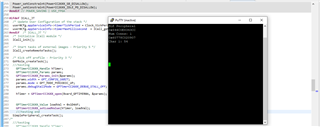Other Parts Discussed in Thread: SYSCONFIG, CC2652R7, SIMPLELINK-CC2640R2-SDK, LAUNCHXL-CC2640R2
Hi,
I want to use GPTimer for the CC2640R2F, which is acting as a server, to precisely sample data at fixed intervals from a sensor. However, I am facing an issue. The timer is indeed precise; however, I am having trouble transmitting the data collected from the sensor via Bluetooth. I am attempting to send the data (6 bytes every 10 ms) using GATT Notifications to another CC2640R2F device, which is acting as the client. Through debugging the code, I see that the problem occurs on this line: 'hTimer = GPTimerCC26XX_open(Board_GPTIMER0A, ¶ms);', which I call in the 'main ...init()' function. If I omit this line, then the GATT Notifications are able to be transmitted from the client to the server (by using a software clock instead to sample the data, which is quite imprecise).
Any ideas about what may be causing this issue with sending notifications and using GPTimer?
Thank you,
Imran


